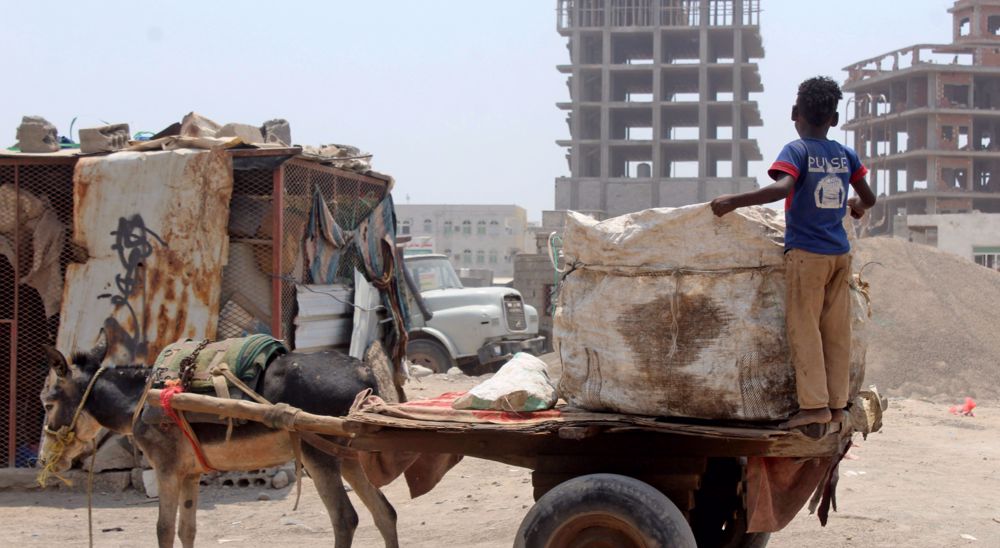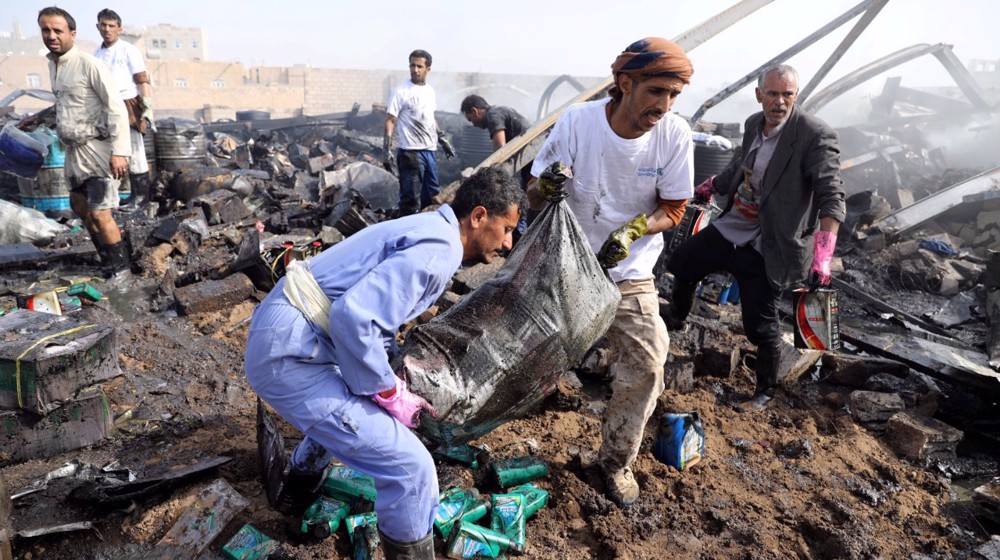Former president Hadi amenable to Aramco deal
Saudi Arabia unleashed its military might against its poor, impoverished neighbor Yemen in 2015, which has resulted in death and destruction of biblical proportions, in a bid, according to Riyadh, to return ousted president Abd Rabbuh Mansur Hadi to power.
Throughout this five year period the Saudis have intentionally allowed the war to rage on with the intent to plunder Yemen’s almost untapped oil and gas reserves amid spiraling chaos and power vacuum.
Ulterior Saudi motives
An expose of Saudi measures to conclude long-term agreements over Yemen’s oil and gas resources with Yemen's ex-President Abd Rabbuh Mansur Hadi was recently published in U.S.-based MintPress News.
The report concludes that the Saudis are seeking to gain control over al-Jawf, Marib, Shabwa, and Hadramout, four provinces with huge oil reserves. The source of this information is thought to be close to Hadi, asserts that negotiations have already begun between the Saudi state-owned oil company Aramco and the Hadi camp.
Daylight robbery.
Jalal al-Salahi, a well-known Yemeni activist, has recently claimed in a video clip to have a copy of the agreement. In the video, which is in Arabic, al-Salahi says that according to the agreement, Riyadh is to pay $15 billion to the Hadi regime in return for seventy years of oil concessions in al-Jawf province.
If true, the agreement is tantamount to daylight robbery considering the truth that the cabinet of the fugitive president holds no legal status in the country anymore. Moreover, it is now an open secret that Hadi and his high-ranking officials are under house arrest in the Saudi kingdom and therefore have no real say in negotiating with the Saudis, anyway.
Everybody has a price, Hadi, but yours is pretty low.
Abd Rabbuh Mansur Hadi has, for all intents and purposes, sold out his country by throwing away the rights to Yemeni oil reserves for a relatively meager sum of $15b which compared to wealth the oil and gas can bring in revenue is very little.
This hardly comes as a surprise since Abd Rabbuh Mansur Hadi had already betrayed his country.
He fled Yemen back in 2015 after the Revolution of September 21, 2014 in which Ansarullah led the revolutionary struggle despite the fact that he was not really forced out of power completely.
In fact, the revolutionary government back then offered him hands in all of the negotiations but he refused this. So when you see that he has also decided to start selling out the Yemeni oil wealth, this is basically the next very tragic but logical step in his campaign of betrayal of the country.
Brecht Jonkers, Historian and Journalist
Riyadh’s historical relationship with its poor unfortunate neighbor, Yemen, has long been fraught with such exploitative moves. Another example of such intractable behaviour would be the 1934 Treaty of Taif, under which Yemen was forced to hand the fledgling Saudi state control over its own provinces of Jizan, Najran, and Asir.
The Saudi interference in Yemeni oil production
Since the onset of war, the Saudis have not allowed the Yemenis to carry out oil exploration in al-Jawf through a constant barrage of bombs, rockets and mortar rounds.
According to WikiLeaks, Riyadh has been blocking Yemen’s investments in its own oil reserves since the 1970s, particularly in al-Jawf which has most of the country’s oil reserves.
The Saudis have become so audacious and confident in their immunity to the consequence that they no longer bother themselves with even a sham agreement when it comes to Yemeni crude oil.
In fact, Saudi oil theft has been a daily occurrence since the outbreak war in Yemeni provinces such as Shabwa, Hadremout, and al-Mahrah.
In the heat of their oil price war with Russia, the Saudis reportedly tripled their oil theft desperately to win a victory, no matter the cost.
Saudi love of Yemeni oil and gas
"Yemen does not only have significant oil reserves but also liquefied natural gas which is something that the Saudis can be looking to put their hands on because it is considered to be a possible replacement or at least a very preferable alternative to typical petroleum. This is also one of the reasons why the Saudis got into conflict with Qatar a few years ago.
Secondly, in the oil price battle waged with Russia, the Saudis have tried to damage the economy of Russia by lowering the price of oil and by pumping up more and more petroleum in their own country. They have, of course, damaged their own economy.
So every single extra source of oil and gas they can find is an extra bonus for Saudi Arabia to continue the oil price battle and to continue to be relevant on the world scale."
Brecht Jonkers, Historian and Journalist
The state of Yemeni reserves
Credible accounts show that 65 percent of all Yemeni oil produced since 2015 has been looted by the Saudis and their Emirati allies. There are also reports coming in of the systematic plundering of Yemeni oil by militant groups allied with Saudi Arabia and the UAE in Marib and other eastern provinces.
The leader of Yemen's Houthi Ansarullah movement Abdul-Malik al-Houthi has claimed that more than 120 million barrels of crude oil have been looted by Saudi Arabia and the UAE since 2016.
The Yemen Ministry of Oil & Minerals figures show that up to 2010, Yemen was estimated to produce around 350 thousand barrels of oil per month. However, by 2015, due to crippling Saudi measures Yemen was barely able to produce more than 35 thousand barrels per day.
According to trading economics, Riyadh has stripped Yemen of revenues from the sale of at least 70,000 barrels a day since the start of the war; a total of over six billion dollars. With that amount of money, the Yemenis would have been in a much better financial condition.
Saudi greed and avarice since its inception
Saudi Arabia, founded in the late 1920’s, has since very early on regarded Yemen as a potential danger, as a sort of competitor in every single aspect, economically, politically and religiously. That's why one of the first wars waged by Saudi Arabia was in 1934 against Yemen in which they took over several important, key provinces of Greater Yemen such as Najran and Jizan whose residents are now considered to be within Saudi Arabia.
Yemen is an ancient nation which plays a very important role in Islamic history, also playing a very important part in the geopolitical structure of the Middle East and of the Red Sea region and even goes as far as, and has influence in, North Africa and on the subcontinent of India and Pakistan.
So, when you see this important historical aspect being played out, there is a very deep-rooted fear in Saudi Arabia that Yemen will constantly be a threat to the relatively new invention of this Saudi Arabia, an invention created by the British and propped up by the Americans.
So the Saudis are afraid of a truly sovereign and self-sufficient Yemen. And that is why they have been funding corrupt regimes, rebel groups, and terrorist movements since the 1930s and they have also been trying to destabilize Yemen ever since the 1930s and even before to make sure that Yemen will not be self-sufficient in terms of oil and gas and will definitely not be a major exporter of oil and gas because that would threaten the bottom line of the Saudi kingdom."
Brecht Jonkers, Historian and Journalist
The Kingdom of Saudi Arabia, despite sitting atop the second-largest proven petroleum reserves and being the largest exporter of petroleum in the world, still has its eye on one of the poorest countries in the world with a view to looting its oil reserves.
'Capitulation': Israeli officials and media concede Gaza defeat as truce unfolds
'Gaza has won': Social media users react to ceasefire with mix of relief, joy
Iran seeks South Korea’s assistance for AI, fiber-optic projects
VIDEO | Iran's 'Eqtedar' (Power) maneuver
Israel hits HTS military target in Syria for 1st time since fall of Assad
VIDEO | Press TV's news headlines
Israel has slaughtered 13,000 students in Gaza, West Bank
VIDEO | More Zionist than Zionists: Biden’s legacy to be defined by Gaza genocide

























 This makes it easy to access the Press TV website
This makes it easy to access the Press TV website